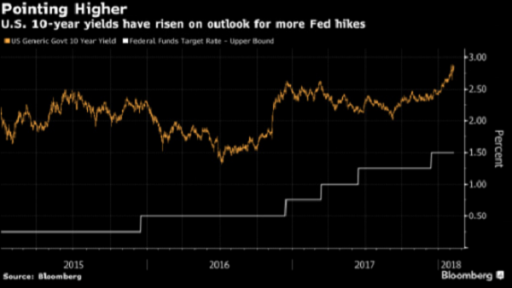- Home
- >
- Fundamental Analysis
- >
- Treasury yields will rise to 3.5% on Fed

Treasury yields will rise to 3.5% on Fed

Treasury 10-year yields will rise to as high as 3.5 percent in the next six months as the market prices in a steeper pace of Federal Reservetightening, according to Goldman Sachs Asset Management.
The U.S. central bank will probably raise interest rates four times this year, defying the consensus for around three, said Philip Moffitt, Asia-Pacific head of fixed income in Sydney at the firm, which oversees more than $1 trillion. Yields will also increase as the Fed trims the holdings of Treasuries it purchased through quantitative easing, he said.
“As QE gets tapered through this year and into next year, we’ve got a big swing in the supply duration coming,” Moffitt said in an interview. “It’s going to put upward pressure on yields. I would think that 3.5 percent is not a very brave forecast.”
The U.S. 10-year yield jumped to a four-year high of 2.89 percent Monday on signs inflation is quickening and amid uncertainty about the path of Fed tightening under new Chairman Jerome Powell. The surge in yields contributed to a selloff in global equities last week as investors reassessed the value of stocks.
Traders are pricing in between two and three hikes in 2018, according to interest-rate swaps, while the median projection from central bank officials is for three. Four hikes are possible if the economic outlook keeps improving, New York Fed President William Dudley said last week.
The 10-year yield will rise to 2.95 percent by the end of September, according to the median forecast of analysts surveyed by Bloomberg. The yield will only reach 3.5 percent in the second quarter of 2020, the surveys show.
Turning Point
Monetary policies in the major developed economies are at a turning point after years of record accommodation in the wake of the global financial crisis. The process of unwinding is seen increasing uncertainty in financial markets after years of shrinking volatility.
While pension funds are likely to seek longer-maturity bonds to boost duration, yields will still rise as the Fed trims its debt holdings, Moffitt said.
The 10-year U.S. Treasury Note Volatility Index, known as TYVIX, jumped to the highest since April last week. Average hourly earnings rose at the fastest pace since 2009 in January, fueling concern the Fed will be more aggressive in combating inflation, a Feb. 2 report showed.
Yields will probably rise to 3 percent to 3.50 percent in the next two quarters, Moffitt said. “Our portfolios are positioned for that so we’d short Treasuries to try to take advantage of rising yields,” he said.
Hedge funds and other large speculators, known for trading on momentum,boosted short bets in 10-year Treasury futures to a record 939,351 contracts, according to Commodity Futures Trading Commission data through Feb. 6.
U.S. 10-year yields are set to be anchored around 2.75 percent to 2.80 percent in the very short term on concern further Fed rate increases will harm the economy, according to Aberdeen Standard Investments.
Yields will only break and stay above 3 percent toward the end of 2018 as the Fed tightens policy further, said Adam McCabe, head of Asian fixed income in Singapore.
“The volatility that we’re experiencing in the market place at the moment is this tug-of-war between those who fear that tighter monetary policy will derail the economic activity, and those who say that tighter monetary policy is playing catch up to stronger economic activity,” he said. If the Fed gets to four hikes this year, “it’s hard to see U.S. Treasuries without a 3 percent handle,” he said.
The Bloomberg U.S. Financial Conditions Index, which tracks the overall level of financial stress in the U.S. money, bond, and equity markets, posted negative readings last week before consolidating at 0.21 Tuesday.
More debt supply to accommodate a growing budget deficit and less Fed buying make Treasuries an “ongoing sell,” said Nader Naeimi, who heads a dynamic investment fund at AMP Capital Investors Ltd. in Sydney.
“The long-end will continue to sell off on supply/demand worries as well as inflation, but the short end will be held back as the Fed will be forced to take it easy on tighter financial conditions as volatility increases,” he said.
Source: Bloomberg Pro Terminal
Jr Trader Alexander Kumanov
 Varchev Traders
Varchev Traders Read more:
If you think, we can improve that section,
please comment. Your oppinion is imortant for us.











